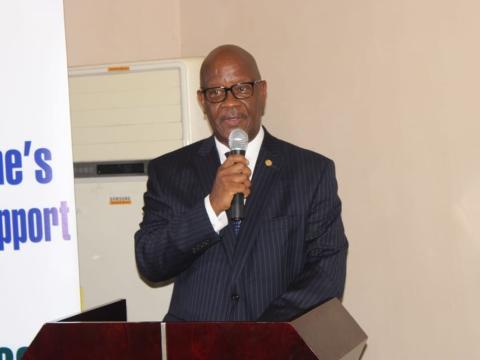By Saio Marrah
The Post-Ebola Recovery Social Investment Fund (PERSIF) has ended a training of trainers’ workshop in the Integrated Disease Surveillance Response (IDSR) for health workers in the Eastern Technical University (ETU) and the College of Medicine and Allied Health Sciences (COMAHS) to tackle subsequent outbreak of diseases.
Speaking at the closing ceremony of the training at COMHAS on Friday, The Chairman of the programme, Mohamed Sheriff said that the project was conceived in 2015 immediately following the Ebola outbreak at the time, but became a reality a year ago.
He said the PERSIF project was as a result of the adverse effect Ebola had on Sierra Leone and its neighboring countries which he said hit the health sector the hardest. He said it put the health system to test and that everything under the health regime almost fell to the ground.
Sheriff said that it was on that basis that the African Development Bank in collaboration with the Rural Water Sanitation Initiative came up with the project of $ 13.5 Million for the two universities.
He said the essence was to strengthen the health system to ensure a reoccurrence of such a disease did not adversely affect the country as it would have been on a better footing to tackle it.
He said there was no way the health system could impact without strengthening the human resource aspect hence the training of trainers.
He said it was also geared towards strengthening the social system in a way that the country could impact the livelihood in the communities most affected. Those affected communities were mostly the border districts of the country like Kailahun, Kono, Kambia, Bombali and Falaba.
The Project Coordinator of PERSIF, David Edward Lahai, informed journalists after the programme that the fund was meant to address some of the challenges left in the wake of the Ebola recovery plan.
He said it was not executed in 2015 because at the time there were some technical challenges in trying to get all the modalities in place to get it started and that it was meant for the three countries but was later reduced to just Sierra Leone and Guinea.
He said that in 2019 the present government had to reengage the donor partners, ADB, to see how they could revive the project, something that led to the “restatement” in October 2019.
He said the project was anchored on three main components, but for the purposes of this session they focused on those areas that were relative to the event.
Lahai said that Component One had to do with the restoration of basic social services, covering training of healthcare workers, the social workforce that includes the grant they were providing to students offering social work courses in universities.
He said it also included the construction of infrastructure like health centres and WASH facilities.
The Coordinator said the second component had to do with the livelihood aspect because the outbreak did not only crumble institutions, but also the livelihoods were also shattered. He therefore said that the communities that were adversely affected were crippling under the yolk of the Ebola scourge.
He said that even though it was already seven years down the line, the country had to ensure they did justice to what went wrong and ensure that they were taken as mitigating measures. He said they could also use the programme as a resilient approach to the crisis the country went through.
He said the livelihood was looking at how they could help women and girls with grants and other packages to ensure their livelihood was rebuilt over time.
Lahai also noted that the project ensured the hotspot of Ebola communities were identified with a view to identifying ways of rebuilding their lives.
A beneficiary of the training, Haja Tejan who is a lecturer of Faculty of Nursing at COMHAS, said the training programme was very important for them as health workers because when Ebola came they were not aware and were not on a good footing on both IPC and surveillance.
She noted that the programme had equipped them by learning to surveillance and to detect early warning and to implement ways of tackling emergencies and outbreaks.
As they were being trained to train their students, they would ensure to pass on the message to them right from the first year students, noting that they would include the training into their microbiology training.
As for the second year students, she went on, they would include it in their fundamentals of nursing, while the third year students would be included in their communicable diseases, she went on.
This would help to put them on a better footing in their communities as well as in the wards, she said.
She said they will be training the nurses, the laboratorists, pharmacies and so on, but noted that all health workers need the training by the way.
Ms. Tejan also noted that the reason for all health workers to be included into the training was because they would be mingling with patients living in the communities.
The lesson she learnt from the training, she said, was that in terms of emergency situations everybody should be involved to know about infectious diseases and know what to report.
Copyright © 2022 Politico Online (31/10/22)








